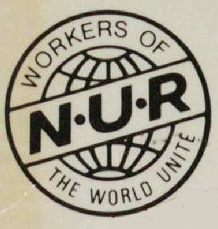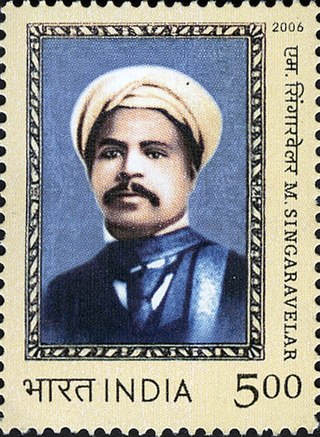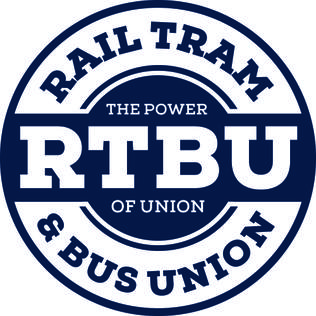Related Research Articles
Labour laws, labour code or employment laws are those that mediate the relationship between workers, employing entities, trade unions, and the government. Collective labour law relates to the tripartite relationship between employee, employer, and union.
The Associated Society of Locomotive Engineers and Firemen (ASLEF) is a British trade union representing drivers of trains including services such as the London Underground (Tube). It is part of the International Transport Workers' Federation and the European Transport Workers' Federation. At the end of 2019 ASLEF had 24,479 members. Mick Whelan became its General Secretary in 2011.

George Mathew Fernandes was an Indian trade unionist, statesman, and journalist, who served as the 22nd Defence Minister of India from 1998 until 2004. A veteran socialist, he was a member of the Lok Sabha for over 30 years, starting from Bombay in 1967 till 2009 mostly representing constituencies from Bihar. He was a key member of the Janata Dal and the founder of the Samata Party. Holding several prominent ministerial portfolios during his career, including communication, industry, railways, and defence, he was posthumously awarded the Padma Vibhushan, India's second highest civilian award, in 2020.
Trade unions in India are registered and file annual returns under the Trade Union Act (1926). Statistics on trade unions are collected annually by the Labour Bureau of the Ministry of Labour, Government of India. As per the latest data, released for 2012, there were 16,154 trade unions which had a combined membership of 9.18 million. The trade union movement in India is largely divided along political lines and follows a pre-Independence pattern of overlapping interactions between political parties and unions. The net result of this type of system is debated as it has both advantages and disadvantages. According to the data submitted by various trade unions to the Ministry of Labour and Employment as part of a survey, INTUC with a combined membership of 33.3 million, has emerged as the largest trade union in India as of 2013.
The Australian labour movement began in the early 19th century and since the late 19th century has included industrial and political wings. Trade unions in Australia may be organised on the basis of craft unionism, general unionism, or industrial unionism. Almost all unions in Australia are affiliated with the Australian Council of Trade Unions (ACTU), many of which have undergone a significant process of amalgamations, especially in the late 1980s and early 1990s. The leadership and membership of unions hold and have at other times held a wide range of political views, including socialist, democratic and right-wing views.

The National Union of Railwaymen was a trade union of railway workers in the United Kingdom. The largest railway workers' union in the country, it was influential in the national trade union movement.

The All India Trade Union Congress (AITUC) is the oldest trade union federation in India. It is associated with the Communist Party of India. According to provisional statistics from the Ministry of Labour, AITUC had a membership of 14.2 million in 2013. It was founded on 31 October 1920 with Lala Lajpat Rai as its first president.
The eight-hour day was a social movement to regulate the length of a working day, preventing excesses and abuses of working time.

Basawon Singh or Basawan Singh also known as Basawon Sinha, was an Indian independence activist and a campaigner for the rights of the underprivileged, industrial labourers and agricultural workers.

The 1948 Queensland railway strike was a strike which lasted nine weeks, from 3 February to 5 April 1948, over wages of workers at railway workshops and locomotive depots in Queensland, Australia.

Malayapuram Singaravelu, also known as M. Singaravelu and Singaravelar, was a pioneer in more than one field in India. In 1918, he founded the first trade union in India. On 1 May 1923 he organised the first ever celebration of May Day in the country. Singaravelar was a major leader of the Indian independence movement, initially under the leadership of Gandhi, but later, joining the budding communist movement. In 1925, he became one of the founding fathers of the Communist Party of India; and chaired its inaugural convention in Kanpur. Though the British Government arrested him along with other leaders on charges of conspiring to wage war against the Crown, he was set free, soon after, on account of his failing health. Singaravelar was also a path-breaking social reformer who in his early life took to Buddhism, seeing it as a weapon against the evil of untouchability, which was particularly severe in the 19th-century India. He was also in the forefront of Self respect movement, in the Madras Presidency that fought for equal rights for backward castes. Though in his advanced years, he withdrew from active politics, Singaravelar remained a staunch advocate of the causes he had pioneered till his death at the age of 85.
Labour in India refers to employment in the economy of India. In 2020, there were around 476.67 million workers in India, the second largest after China. Out of which, agriculture industry consist of 41.19%, industry sector consist of 26.18% and service sector consist 32.33% of total labour force. Of these over 94 percent work in unincorporated, unorganised enterprises ranging from pushcart vendors to home-based diamond and gem polishing operations. The organised sector includes workers employed by the government, state-owned enterprises and private sector enterprises. In 2008, the organised sector employed 27.5 million workers, of which 17.3 million worked for government or government owned entities.
Demetrio Vallejo was a railroad worker and union activist from Tehuantepec, Oaxaca, Mexico. Vallejo began working as a railroad employee in 1928, later joining the Partido Comunista Mexicano (PCM) in 1934. Vallejo was eventually promoted to Regional Director of the PCM in Oaxaca, however later expelled in 1946. In 1946, Vallejo joined the Unified Socialist Action and later the Mexican Worker-Peasant Party (Spanish: Partido Obrero-Campesino Mexicano at its founding in 1950. Vallejo was a primary leader of the Mexican railroad strikes of 1958–59.

Indian labour law refers to law regulating labour in India. Traditionally, the Indian government at the federal and state levels has sought to ensure a high degree of protection for workers, but in practice, this differs due to the form of government and because labour is a subject in the concurrent list of the Indian Constitution. The Minimum Wages Act 1948 requires companies to pay the minimum wage set by the government alongside limiting working weeks to 40 hours. Overtime is strongly discouraged with the premium on overtime being 100% of the total wage. The Payment of Wages Act 1936 mandates the payment of wages on time on the last working day of every month via bank transfer or postal service. The Factories Act 1948 and the Shops and Establishment Act 1960 mandate 15 working days of fully paid vacation leave and 7 casual leaves each year to each employee, with an additional 7 fully paid sick days. The Maternity Benefit (Amendment) Act, 2017 gives female employees of every company the right to take 6 months' worth of fully paid maternity leave. It also provides for 6 weeks worth of paid leaves in case of miscarriage or medical termination of pregnancy. The Employees' Provident Fund Organisation and the Employees' State Insurance, governed by statutory acts provide workers with necessary social security for retirement benefits and medical and unemployment benefits respectively. Workers entitled to be covered under the Employees' State Insurance are also entitled to 90 days worth of paid medical leaves. A contract of employment can always provide for more rights than the statutory minimum set rights. The Indian parliament passed four labour codes in the 2019 and 2020 sessions. These four codes will consolidate 44 existing labour laws. They are: The Industrial Relations Code 2020, The Code on Social Security 2020, The Occupational Safety, Health and Working Conditions Code, 2020 and The Code on Wages 2019.
The 1928 South Indian railway strike was a general strike by the South Indian Railway Workers Union against plans of the South Indian Railway Company to lay off over 3,100 workers in order to reduce the expenditures of the company. The strike lasted from 29 June – 2 August 1928, and severely affected the transportation of people and goods across South India. The Madras government and the South Indian Railway Company responded with a crackdown. Most of the leaders of the strike were arrested and recognition to the union was withdrawn. The Government of Madras recorded it as the "most important event of the year".
The All India Station Masters' Association (AISMA) (Regd. No. NDD/09) is an Indian trade union representing the Station Masters of Indian Railways. Formed in 1953, it is among the best examples of work-category based unions in the Indian railway industry. AISMA represents Assistant Station Masters (ASMs), Station Masters (SMs), Station Managers (SMRs) and Transportation Inspectors (TIs), numbering to 37000.
The Rhodesian Railway Workers' Union (R.R.W.U.) was a trade union in Rhodesia which represented European railway workers employed by the Rhodesian Railways.

The Rail, Tram and Bus Union Victorian Branch or RTBU Victoria is the state branch of the RTBU in Victoria. Originally formed in 1993 as the Victorian branch of the Public Transport Union and renamed the RTBU in 1998, the RTBU Victoria today represents nearly 8000 members across Rail Operations, Tramways, Locomotive, Infrastructure and Administrative areas of Victoria's public transport industry.
The South African Railways and Harbours Union was formed by black workers of the South African Railways and Harbours Administration after they had been expelled from the National Union of Railway and Harbour Servants.
The All India Railwaymen's Federation (AIRF) is the largest trade union of Indian Railways workers with a membership of 1.4 million. AIRF was founded on 16 February 1925. It is affiliated with the socialist trade union centre Hind Mazdoor Sabha.
References
- 1 2 3 Sridhar, V (15 September 2001). "Chronicle of a strike". Frontline. Vol. 18, no. 19. Archived from the original on 27 May 2012. Retrieved 28 September 2023.
- ↑ "INDIA: Strangulating Strike". TIME . 20 May 1974. Archived from the original on 22 December 2008. Retrieved 11 February 2012.
- 1 2 3 4 Sherlock, Stephen (14 October 1989). "Railway Workers and Their Unions: Origins of 1974 Indian Railways Strike". Economic and Political Weekly . 24 (41): 2311–2322. JSTOR 4395459 . Retrieved 28 September 2023.
- ↑ "THE INDIAN RAILWAYS STRIKE OF 1974: A Study of Power and Organised Labour". Indian railway employee website. Indian railway employee. Retrieved 5 June 2018.
- ↑ Sherlock, Stephen (1 February 2001). The Indian railways strike of 1974: A study of power and organised labour (Hardcover ed.). Mumbai: Rupa & Co. ISBN 8171675344.
- ↑ Ramakrishnan, Nitya (3 June 2018). "Remembering George Fernandes As He Was, Before He Lost Himself". The Wire. Retrieved 5 June 2018.
- ↑ "Looking back at anger". The Hindu . 6 January 2002. Archived from the original on 6 March 2005. Retrieved 28 September 2023.